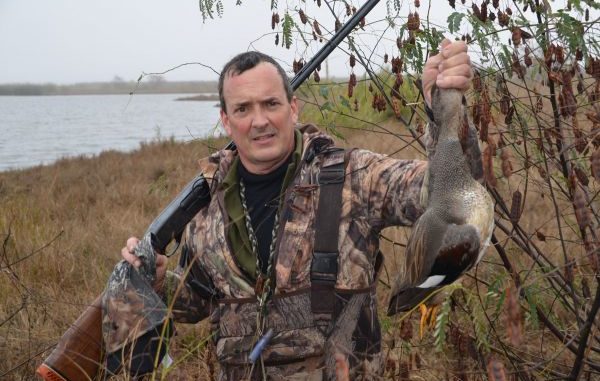
“I’ve always been fascinated by ducks,” Mike Carloss said with a grin. “My dad bought two baby ducks for me when I was little. They grew up to be Muscovys and ran loose around the yard.
“The two ducks were a pair and turned into many ducks. We ended up eating them. Me and some of my sisters and brothers watched as the family helper whacked their heads off with a hatchet. I remember them running around the yard headless.”
He was the only child who became an outdoorsman.
“Our family was a large one — 11 kids. None of them turned out to be the hunter and fisherman I am,” the handsome biologist said. “None of my relatives hunted, either.
“Cooking was in our genes. My mom, who died when I was 9, was from Tennessee and Florida, and my dad was from Kentwood. But my step-mom was Cajun. Now, I have two brothers who own Cajun restaurants in Montana and another brother in Montana who is a caterer.
“We all love cooking.”
Although young Carloss loved spending time in the kitchen, he liked to be outside even more.
After BB guns and pellet guns, he started “serious hunting,” as he called it, with friends in his early teens. His first shotgun was a 20-gauge Ted Williams crack barrel he bought with his paper route earnings.
At 17 he got a summer job with the Louisiana Department of Wildlife and Fisheries at Rockefeller Refuge. And he lived there all summer.
“I thought that I had died and gone to heaven,” he said of that summer job. “I did grunt work — washed vehicles and airboats, and fed the alligators in the enclosures. I did it again the next summer, after my senior year.
“At the end of the summer, an old biologist named Howard Dupuis asked me if I wanted to stay to help him band ducks instead of go to college.”
That was a big much for his father.
“But my dad encouraged me to go to college,” Carloss said. “Ted Joanen, the manager of Rockefeller Refuge, also pushed me to go to college rather than be a technician for LDWF.
“So I went to the University of Southwestern Louisiana and got a degree in wildlife management in 1984. But I continued to work for LDWF in summers and part time while I was in school.”
Carloss followed that bachelor’s degree with a master’s in biology from the same university. While he was doing that, he taught biology lab for undergraduate students for two years as part of his assistantship.
After graduation, Carloss went to work full time for the LDWF as a wildlife management specialist at Marsh Island Wildlife Refuge. There, he did a lot of work with fur animals: trap testing, marsh burning for management and data collection on environmental factors.
As if a full-time job wasn’t enough, he also attended the LSU Law Enforcement Academy.
Having finally achieved biologist status instead of that of a technician, he continued working at Marsh Island for eight years.
He began banding ducks as a hobby rather than as part of his job.
Interestingly, he did very little hunting there.
“It was a refuge, and I didn’t have a boat,” he explained.
He did hunt, though, on his father’s duck lease near Esther. Then, in 1988 he made a hunt with a co-worker on the Atchafalaya Delta Wildlife Management Area.
“We didn’t know what we were doing, but we killed mallards,” Carloss said. “I said, ‘Man, this is nice!’ I got interested in the WMA and combined some law enforcement work there with duck hunting. We camped on the Wax (Delta); there were only three houseboats out there then.
“In 1993, the supervisor of Atchafalaya Delta WMA moved to another position. The job wasn’t a biologist job, but I wanted that job. It was such a cool place for a duck hunter and biologist.”
Taking the job was actually a demotion, since at that time a WMA supervisor’s position was not slotted as a biologist’s job, but he took it enthusiastically.
He oversaw the management of the WMA’s two deltas, and he hunted virtually every morning or evening as duties allowed.
“The hunting was so good that the hunts could be very short,” Carloss grinned. “It was one of the coolest places I ever hunted — the variety was amazing, the numbers of birds. In the early to mid-’90s, you could see waves of mallards and canvasbacks coming in off the bay.
“When we did biologist aerial surveys, we saw a sea of birds.”
Carloss worked on the delta from 1993 to 1998. In 1996, administrators revoked the fish and wildlife law enforcement privileges from WMA and refuge management personnel in a highly controversial internal move within the department.
Looking for a new challenge, newly wed Carloss took a job as manager of the Lake Fausse Pointe State Park within the Office of State Parks in the Louisiana Department of Culture, Recreation and Tourism.
Probably not “ducky” enough for him, he moved to the Natural Resource Conservation Service in Lafayette in 2002, accepting a biologist’s position doing coastal restoration work.
“I had always thought that I wanted to work for the feds,” he explained.
Two years later, former head of State Parks and then secretary of LDWF Dwight Landreneau came knocking. He wanted Carloss as program manager for the department’s Natural Heritage, Scenic Rivers and Permitting sections.
In 2007, he became head of Coastal Operations within the department’s Fur and Refuge Division, overseeing all coastal WMAs (including Atchafalaya Delta) and refuges except Rockefeller Wildlife Refuge.
He was getting duckier.
In 2009, he reluctantly applied for and got the sssistant administrator’s position of the division, recently renamed the Coastal and Nongame Resources Division. He remained there until his retirement in 2014.
In 2013, Ducks Unlimited courted him to work for them. Upon retirement, he did so, as manager of conservation programs. The position put him as the lead biologist housed in the state for the venerable waterfowl conservation organization.
Mike Carloss is still an active duck hunter. He fits 15 to 20 days of waterfowl hunting into his schedule, mostly on his lease north of Creole. He shares the lease with three other hunters, who are naturally enough biologists.
When asked about his career experiences, he stared pensively at the ceiling before answering.
“I do miss the Louisiana Department of Wildlife and Fisheries,” Caroloss said. “I especially miss the Atchafalaya Delta Wildlife Management Area.
“It’s a bright spot on the Louisiana coast.”


